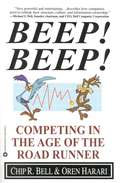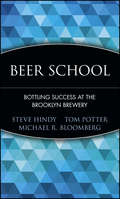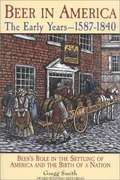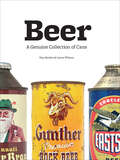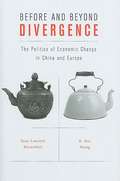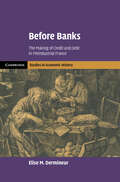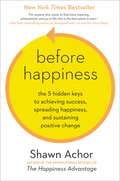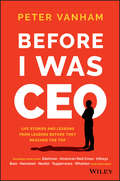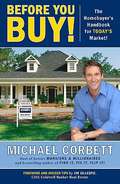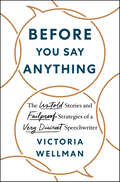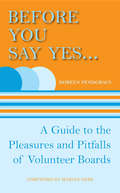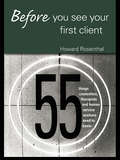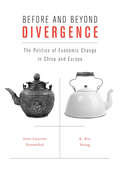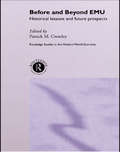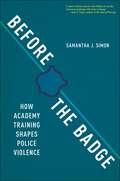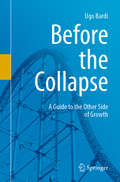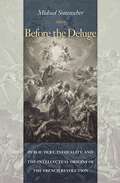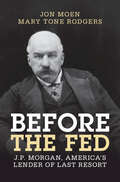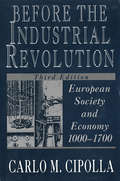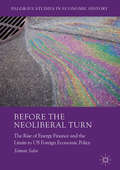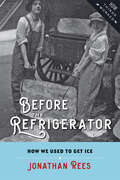- Table View
- List View
Beep! Beep!: Competing In The Age Of The Road Runner
by Chip R. Bell Oren HarariIn todays business world there are two kinds of executives the Wile E. Coyote and the Road Runner. For most executives today, the Coyote has become the prevailing metaphor, as they rely more on conventional and outdated resources. This doesnt have to be the case, as Bell and Harari show entrepreneurs how to hit the road running with speed and adaptability to harsh conditions.
Beer Game: Board Version
by Janice H. HammondThe beer game is an exercise that demonstrates supply channel dynamics. Simulates the flow of material and information in a simplified channel of beer production and distribution, focusing on the linkages among a beer manufacturer, its distributors, a wholesaler, and a retailer. Students are organized into teams of four, each assigned to place orders and manage inventory for one firm in the channel. In this simplified channel, orders are the only information allowed to flow among channel participants. Despite the simplicity of the simulation, most teams find it extremely difficult to keep inventory and stockout costs low. The instructor can work with students to understand the nature of the problems they experience, identify the causes, and discuss possible remedies. The 90-minute exercise is played on game boards that are available from the Systems Dynamics Society (518-442-3865).
Beer School
by Michael R. Bloomberg Steve Hindy Tom PotterWhat do you get when you cross a journalist and a banker? A brewery, of course."A great city should have great beer. New York finally has, thanks to Brooklyn. Steve Hindy and Tom Potter provided it. Beer School explains how they did it: their mistakes as well as their triumphs. Steve writes with a journalist's skepticism-as though he has forgotten that he is reporting on himself. Tom is even less forgiving-he's a banker, after all. The inside story reads at times like a cautionary tale, but it is an account of a great and welcome achievement."--Michael Jackson, The Beer Hunter(r)"An accessible and insightful case study with terrific insight for aspiring entrepreneurs. And if that's not enough, it is all about beer!"--Professor Murray Low, Executive Director, Lang Center for Entrepreneurship, Columbia Business School"Great lessons on what every first-time entrepreneur will experience. Being down the block from the Brooklyn Brewery, I had firsthand witness to their positive impact on our community. I give Steve and Tom's book an A++!"--Norm Brodsky, Senior Contributing Editor, Inc. magazine"Beer School is a useful and entertaining book. In essence, this is the story of starting a beer business from scratch in New York City. The product is one readers can relate to, and the market is as tough as they get. What a fun challenge! The book can help not only those entrepreneurs who are starting a business but also those trying to grow one once it is established. Steve and Tom write with enthusiasm and insight about building their business. It is clear that they learned a lot along the way. Readers can learn from these lessons too."--Michael Preston, Adjunct Professor, Lang Center for Entrepreneurship, Columbia Business School, and coauthor, The Road to Success: How to Manage Growth"Although we (thankfully!) never had to deal with the Mob, being held up at gunpoint, or having our beer and equipment ripped off, we definitely identified with the challenges faced in those early days of cobbling a brewery together. The revealing story Steve and Tom tell about two partners entering a business out of passion, in an industry they knew little about, being seriously undercapitalized, with an overly naive business plan, and their ultimate success, is an inspiring tale."--Ken Grossman, founder, Sierra Nevada Brewing Co.
Beer in America: Beer's Role in the Settling of America and the Birth of a Nation
by Gregg SmithOne of the most important but little-known aspects of early American history is the role of beer in our country's founding and formative years. This definitive account of beer's impact on people and events that shaped the birth of a nation will astonish readers. Beginning with the pre-colonial era and ending with America's emergence as an industrial power, this book is a fresh and swiftly flowing adventure.
Beer: A Genuine Collection of Cans
by Dan Becker Lance Wilson&“Lends some insight into the evolution of beer can design and the changing conversation with the consumer through its 500 images.&” —Cool Hunting Ever crack open a can of Chief Oshkosh of Wisconsin, or sample Pabst&’s Big Cat Malt Liquor? Remember the original St. Pauli Girl, Tennent&’s bevy of lager lovelies, or Olde Frothingslosh (&“the pale stale ale with the foam on the bottom&”)? Presented alphabetically by brand, the nearly 500 cans collected here come from thirty countries and range from the iconic to the obscure to the downright bizarre. From long-forgotten brews to classic brands that have changed their look but never gone out of style, Beer offers a peek into the last century of beer culture, exploring what we drank, how we drank it, and why we picked it off the shelf. While it may not be as refreshing as a frosty cold can of Bud, cracking open this book is certain to stimulate beer lovers and design fans alike. &“A great look back at the history of beer design and advertising throughout the last century. I&’m sure most beer lovers could appreciate this particular book.&” —PhillyBurbs &“From the deliciously ephemeral Schmidt&’s City Club, to the ambiguous &‘Lite Beer&’—the collection will have you saying, &‘Who the hell ever drank that?&’ and perhaps, &‘What the hell was I thinking in college?&’&” —Foodiggity
Before And Beyond Divergence: The Politics Of Economic Change In China And Europe
by Jean-Laurent Rosenthal Roy Bin WongChina has reemerged as a powerhouse in the global economy, reviving a classic question in economic history: why did sustained economic growth arise in Europe rather than in China? <p><p> Many favor cultural and environmental explanations of the nineteenth-century economic divergence between Europe and the rest of the world. This book, the product of over twenty years of research, takes a sharply different tack. It argues that political differences which crystallized well before 1800 were responsible both for China's early and more recent prosperity and for Europe's difficulties after the fall of the Roman Empire and during early industrialization. <p> Rosenthal and Wong show that relative prices matter to how economies evolve; institutions can have a large effect on relative prices; and the spatial scale of polities can affect the choices of institutions in the long run. Their historical perspective on institutional change has surprising implications for understanding modern transformations in China and Europe and for future expectations. It also yields insights in comparative economic history, essential to any larger social science account of modern world history.
Before Banks: The Making of Credit and Debt in Preindustrial France (Cambridge Studies in Economic History - Second Series)
by Elise M. DermineurThis innovative work delves into the world of ordinary early modern women and men and their relationship with credit and debt. Elise Dermineur focuses on the rural seigneuries of Delle and Florimont in the south of Alsace, where rich archival documents allow for a fine cross-analysis of credit transactions and the reconstruction of credit networks from c.1650 to 1790. She examines the various credit instruments at ordinary people's disposal, the role of women in credit markets, and the social, legal, and economic experiences of indebtedness. The book's distinctive focus on peer-to-peer lending sheds light on how and why pre-industrial interpersonal exchanges featured flexibility, diversity, fairness, solidarity and reciprocity, and room for negotiation and renegotiation. Before Banks also offers insight into factors informing our present financial system and suggests that we can learn from the past to create a fairer society and economy.
Before Happiness: The 5 Hidden Keys To Achieving Success, Spreading Happiness, And Sustaining Positive Change
by Shawn AchorWhy are some people able to make positive change while others remain the same? In his international bestseller, The Happiness Advantage, Harvard trained researcher Shawn Achor described why happiness is the precursor to greater success. This book is about what comes before both. Because before we can be happy or successful, we need to first develop the ability to see that positive change is possible. Only once we learn to see the world through a more positive lens can we summon all our motivation, emotion, and intelligence to achieve our personal and professional goals. In Before Happiness, Achor reveals five actionable, proven strategies for changing our lens to positive: - The Most Valuable Reality: See a broader range of ideas and solutions by changing the details on which your brain chooses to focus - Success Mapping: Set goals oriented around the things in life that matter to you most, whether career advancement or family or making a difference in the world - The X-spot: Use success accelerants to propel you more quickly towards those goals, whether finishing a marathon, reaching a sales target, learning a language, or losing 10 pounds - Noise-Canceling: Boost the signal pointing you to opportunities and possibilities that others miss - Positive Inception: Transfer these skills to your team, your employees, and everyone around you By mastering these strategies, you’ll create an renewable source of positivity, motivation, and engagement that will allow you to reach your fullest potential in everything you do.
Before I Was CEO: Life Stories and Lessons from Leaders Before They Reached the Top
by Peter VanhamHave you always known what you wanted to be in life? What are some "watershed moments" that made you who you are? When did you get on track to become a successful CEO? It started with three questions at Davos. The younger Peter Vanham looked to the answers from the elite leaders he asked to validate his own career choice, and the rich, private wisdom he received revealed more about building a career than he'd found anywhere else. He shares it all with you in Before I Was CEO. For everyone who lays awake at night wondering if they're heading up or down the corporate ladder, this collection of personal stories from a remarkable group of the most accomplished men and women in business today proves everyone can put themselves in the C-suite by taking a variety of different paths--it's all how you do it. Some found opportunity through adversity and others came by their big-break moments through serendipity. A group of them walked away from corporate life and lived in other ways and all of them made calculated moves to advance their careers. In their own words, read how it all unfolded, the tough decisions they wrestled, the risks and rewards they saw, and how it all came together. You don't need a royal pedigree or Ivy League education to reach the top as long as you: * Value family, leave home, and make informed decisions based on your dreams * Take the first thirty-five years of your life to discover what you're interested in and don't rush to be a CEO * Strategically deal with failure, remember the lessons you learned, and adapt to situations you can't change You aren't the first person to be at the crossroads you're standing in, and with the motivating and instructive stories in Before I Was CEO, you may be answering a young journalist's questions at Davos one day.
Before You Begin: Preparing Yourself for the Challenges of Adaptive Leadership
by Alexander Grashow Marty Linsky Ronald HeifetzTo successfully lead adaptive change, you must connect with the values, beliefs, and anxieties of the people you are trying to move. But in addition to mobilizing others, adaptive leadership requires you to do some introspective work as well. Practicing adaptive leadership is difficult on the one hand and profoundly meaningful on the other--it is not something you should enter into casually. This chapter provides four tips to consider before taking the leap. This chapter was originally published as chapter 3 of "The Practice of Adaptive Leadership: Tools and Tactics for Changing Your Organization and the World."
Before You Buy!
by Michael CorbettRead Michael Corbett's blogs and other content on the Penguin Community. The bestselling author of Find It, Fix It, Flip It! returns with a new book specifically tailored for today's market. After a period of dramatic flux, the real estate market is rebounding- but the playing field is tougher than ever. Michael Corbett, bestselling author and the host of NBC's Extra!'s Mansions and Millionaires, teaches today's prospective homebuyers everything they need to know, including: •Why Now is the Time to Buy •The 10 Most Costly Buyers' Blunders •Five Before-You-Buy Checklists for Each Type of Property •How to Navigate Foreclosures and Short Sales •Inspections, Mortgages, Closings, and Beyond Corbett is a household name, and real estate novices and seasoned buyers alike will want to benefit from his expertise. .
Before You Say Anything: The Untold Stories and Failproof Strategies of a Very Discreet Speechwriter
by Victoria WellmanThe convention-breaking creative process of New York's busiest speechwriter, offering a holistic approach to crafting every kind of speech.The ability to express yourself in words has become both a rite of passage and an essential skill for anyone who wants to make a difference within their family, community, workplace, or beyond. And yet, strategies for engaging a new generation of media and tech-savvy audiences have failed to keep up with the times, leaving speakers wondering how to articulate a resonant message that bristles with detail, authenticity, and emotional truth. While we can’t all expect to captivate and inspire millions as Barack Obama and Greta Thunberg have, every speaker—regardless of their experience—can follow a road map to elevate a narrative from serviceable to unforgettable. This is true whether you’re roasting a colleague at an office party, delivering a keynote industry address, accepting an award, or eulogizing a loved one. In Before You Say Anything, Victoria Wellman—the founder and president of Manhattan-based speechwriting company The Oratory Laboratory—shares her unique methodology for researching, reimagining, crafting, and delivering an outstanding speech by focusing on three core objectives: respect for the audience, the restless pursuit of originality, and intentionality behind every word. Full of hilarious anecdotes and examples from Wellman’s extensive experience as the go-to speechwriter for power players and everyday people from around the world, Before You Say Anything is an irresistible antidote to the age-old doctrine of what a speech must include. Instead, it will leave readers with an enlightened and refreshing way of thinking about their sources, ideas, and material, and give them a strategy for putting it all to use.
Before You Say Yes ...: A Guide to the Pleasures and Pitfalls of Volunteer Boards
by Doreen PendgracsDoreen Pendgracs has sat on various boards of directors for the past twenty-five years. During that time, she has gleaned valuable information that she shares in an easy-to-understand, conversational style for novices and seasoned members alike. Whether you’re asked to sit on a trade union board, a non-profit board for a community group or church, a business-focused board of an association or chamber of commerce, or the board of a charitable organization, Before You Say Yes … gives you the inside scoop on what questions to ask and what you need to do before you take the plunge. Ms. Pendgracs leads the reader through the intricacies of management style, board etiquette and responsibilities, Robert’s Rules of Order, directors’ and officers’ insurance, and financial obligations and compensation. You’ll also discover what happens in the case of a lawsuit or how to implement a disaster plan, how to welcome new board members and deal with difficult people, and what benefits board membership can bring to your personal life and career.
Before You See Your First Client: 55 Things Counselors, Therapists and Human Service Workers Need to Know (Human Services Library)
by Howard RosenthalBefore You See Your First Client begins where courses, workshops, training seminars, and textbooks leave off, providing a candid behind-the-scenes look at the fields of therapy, counseling and human services. In a reader-friendly and accessible style, Dr. Howard Rosenthal offers his readers 55 useful and practical ideas for the implementation, improvement, and expansion of one's mental health practice. Based on the author's own personal experiences, the book is written in an intimate and personal style to which inexperienced and beginning therapists can easily relate.
Before and Beyond Divergence: The Politics of Economic Change in China and Europe
by Jean-Laurent Rosenthal Roy Bin WongChina has reemerged as a powerhouse in the global economy, reviving a classic question in economic history: why did sustained economic growth arise in Europe rather than in China? Many favor cultural and environmental explanations of the nineteenth-century economic divergence between Europe and the rest of the world. This book, the product of over twenty years of research, takes a sharply different tack. It argues that political differences which crystallized well before 1800 were responsible both for China’s early and more recent prosperity and for Europe’s difficulties after the fall of the Roman Empire and during early industrialization. Rosenthal and Wong show that relative prices matter to how economies evolve; institutions can have a large effect on relative prices; and the spatial scale of polities can affect the choices of institutions in the long run. Their historical perspective on institutional change has surprising implications for understanding modern transformations in China and Europe and for future expectations. It also yields insights in comparative economic history, essential to any larger social science account of modern world history.
Before and Beyond EMU: Historical Lessons and Future Prospects (Routledge Studies In The Modern World Economy Ser. #Vol. 35)
by Patrick M. CrowleyThe launch of the Euro has already had profound effects on both European economies and societies - but it is also of huge importance for the international community as a whole. This timely book, from a collection of key names in European Integration Studies, is an authoritative piece of work that is truly multi-disciplinary by nature.
Before the Badge: How Academy Training Shapes Police Violence
by Samantha J. SimonAn inside look at how police officers are trained to perpetuate state violenceMichael Brown. Philando Castile. George Floyd. Breonna Taylor. As the names of those killed by the police became cemented into public memory, the American public took to the streets in unprecedented numbers to mourn, organize, and demand changes to the current system of policing. In response, police departments across the country committed themselves to change, pledging to hire more women and people of color, incorporate diversity training, and instruct officers to verbally de-escalate interactions with the public.These reform efforts tend to rely on a “bad apple” argument, focusing the nature and scope of the problem on the behavior of specific individuals and rarely considering the broader organizational process that determines who is allowed to patrol the public and how they learn to do their jobs. In Before the Badge, Samantha J. Simon provides a firsthand look into how police officers are selected and trained, describing every stage of the process, including recruitment, classroom instruction, and tactical training.Simon spent a year at police academies participating in the training alongside cadets, giving her a visceral, hands-on understanding of how police training operates. Using rich and detailed examples, she reveals that the process does more than test a cadet’s physical or intellectual abilities. Instead, it socializes cadets into a system of state violence. As training progresses, cadets are expected to see themselves as warriors and to view Black and Latino/a members of the public as their enemies. Cadets who cannot or will not uphold this approach end up washing out. In Before the Badge, Simon explains how this training creates a context in which patterns of police violence persist and implores readers to re-envision the future of policing in the United States.
Before the Collapse: A Guide to the Other Side of Growth
by Ugo BardiNobody has to tell you that when things go bad, they go bad quickly and seemingly in bunches. Complicated structures like buildings or bridges are slow and laborious to build but, with a design flaw or enough explosive energy, take only seconds to collapse. This fate can befall a company, the stock market, or your house or town after a natural disaster, and the metaphor extends to economies, governments, and even whole societies. As we proceed blindly and incrementally in one direction or another, collapse often takes us by surprise. We step over what you will come to know as a “Seneca cliff”, which is named after the ancient Roman philosopher, Lucius Annaeus Seneca, who was the first to observe the ubiquitous truth that growth is slow but ruin is rapid. Modern science, like ancient philosophy, tell us that collapse is not a bug; it is a feature of the universe. Understanding this reality will help you to see and navigate the Seneca cliffs of life, or what Malcolm Gladwell called “tipping points.” Efforts to stave off collapse often mean that the cliff will be even steeper when you step over it. But the good news is that what looks to you like a collapse may be nothing more than the passage to a new condition that is better than the old.This book gives deeper meaning to familiar adages such as “it’s a house of cards”, “let nature take its course”, “reach a tipping point”, or the popular Silicon Valley expression, “fail fast, fail often.” As the old Roman philosopher noted, “nothing that exists today is not the result of a past collapse”, and this is the basis of what we call “The Seneca Strategy.” This engaging and insightful book will help you to use the Seneca Strategy to face failure and collapse at all scales, to understand why change may be inevitable, and to navigate the swirl of events that frequently threaten your balance and happiness. You will learn:How ancient philosophy and modern science agree that failure and collapse are normal features of the universePrinciples that help us manage, rather than be managed by, the biggest challenges of our lives and times Why technological progress may not prevent economic or societal collapseWhy the best strategy to oppose failure is not to resist at all costsHow you can “rebound” after collapse, to do better than before, and to avoid the same mistakes.
Before the Deluge: Public Debt, Inequality, and the Intellectual Origins of the French Revolution
by Michael SonenscherEver since the French Revolution, Madame de Pompadour's comment, "Après moi, le déluge" (after me, the deluge), has looked like a callous if accurate prophecy of the political cataclysms that began in 1789. But decades before the Bastille fell, French writers had used the phrase to describe a different kind of selfish recklessness--not toward the flood of revolution but, rather, toward the flood of public debt. In Before the Deluge, Michael Sonenscher examines these fears and the responses to them, and the result is nothing less than a new way of thinking about the intellectual origins of the French Revolution. In this nightmare vision of the future, many prerevolutionary observers predicted that the pressures generated by modern war finance would set off a chain of debt defaults that would either destroy established political orders or cause a sudden lurch into despotic rule. Nor was it clear that constitutional government could keep this possibility at bay. Constitutional government might make public credit more secure, but public credit might undermine constitutional government itself. Before the Deluge examines how this predicament gave rise to a widespread eighteenth-century interest in figuring out how to establish and maintain representative governments able to realize the promise of public credit while avoiding its peril. By doing so, the book throws new light on a neglected aspect of modern political thought and on the French Revolution.
Before the Fall: Lehman Brothers 2008
by Clayton Rose Anand AhujaThis case examines Lehman Brothers in the months preceding its collapse. Following the announcement of a huge and unexpected second quarter loss, the CFO was removed from her post after only seven months in the job. This case explores the challenges faced by a firm leader as she attempts to manage a situation that threatens the firm's survival. In particular, the case allows for an examination of how changes in a firm's performance and position are communicated to key external stakeholders in an effort to retain their confidence, while market conditions worsen, the balance sheet deteriorates, and the firm's credibility is challenged by a short selling hedge fund.
Before the Fed: J.P. Morgan, America's Lender of Last Resort (Studies in Macroeconomic History)
by Jon Moen Mary Tone RodgersIn the 19th century the United States had no formal central bank or lender of last resort, but it did have J. P. Morgan. His unique knowledge of financial markets gave him almost omniscient knowledge for crafting solutions to financial crises. Before the Fed examines Morgan's unusual role in resolving the National Banking Era crises in the U. S., exploring the rocky relationships and ultimatums he used to settle financial panics. It traces how he learned crisis management lessons from his father, passing it along to his son in turn. Citing his own ledgers, telegrams and testimony, Jon Moen and Mary Tone Rodgers detail how Morgan applied and modified routine business practices to solve non-routine crises, managing risk and reward in emergency lending. Analyzing forty last resort loans made over his fifty-year career, the authors challenge the invincibility folklore surrounding Morgan, uncovering how he stabilized American markets when others could not.
Before the Industrial Revolution: European Society and Economy, 1000-1700 (Third Edition)
by Carlo M. CipollaThe Third Edition includes substantial revisions and new material throughout the book that will secure its standing as the most useful history available of preindustrial Europe. During the seven hundred years before the Industrial Revolution, the stage was set for Europe's transformation from a backward agrarian society to a powerful industrialized society. An economic historian of international reputation, Carlo M. Cipolla explores the process that made this transformation possible. In so doing, he sheds light not only on the economic factors but on the culture surrounding them.
Before the Neoliberal Turn: The Rise of Energy Finance and the Limits to US Foreign Economic Policy (Palgrave Studies in Economic History)
by Simone SelvaThis book pinpoints continuities and changes in U. S. foreign economic policy from the fixed exchange rate system of the 1960s through to the period between the two oil crises of the 1970s. Chapters pay close attention to the interconnectedness between the long lasting decline of the U. S. Dollar on foreign exchange markets and the U. S. balance of payments, transformations in international capital markets, and international oil developments. The book charts the prolonged failure of Washington's foreign economic policies to restore U. S. financial and monetary leadership through to the Carter Administration.
Before the Refrigerator: How We Used to Get Ice (How Things Worked)
by Jonathan ReesA historical study of how increased access to ice—decades before refrigeration—transformed American life. During the late nineteenth and early twentieth centuries, Americans depended upon ice to stay cool and to keep their perishable foods fresh. Jonathan Rees tells the fascinating story of how people got ice before mechanical refrigeration came to the household. Drawing on newspapers, trade journals, and household advice books, Before the Refrigerator explains how Americans built a complex system to harvest, store, and transport ice to everyone who wanted it, even the very poor. Rees traces the evolution of the natural ice industry from its mechanization in the 1880s through its gradual collapse, which started after World War I. Meatpackers began experimenting with ice refrigeration to ship their products as early as the 1860s. Starting around 1890, large, bulky ice machines the size of small houses appeared on the scene, becoming an important source for the American ice supply. As ice machines shrunk, more people had access to better ice for a wide variety of purposes. By the early twentieth century, Rees writes, ice had become an essential tool for preserving perishable foods of all kinds, transforming what most people ate and drank every day. Reviewing all the inventions that made the ice industry possible and the way they worked together to prevent ice from melting, Rees demonstrates how technological systems can operate without a central controlling force. Before the Refrigerator is ideal for history of technology classes, food studies classes, or anyone interested in what daily life in the United States was like between 1880 and 1930.&“An in-depth portrayal of a once-indispensable, life-changing technology, the former existence of which is as unknown to most of us as that of the telegraph or canal is to today&’s undergraduates. . . . Rees synthesizes considerable archival research and presents interpretations of importance to scholars. . . . Before the Refrigerator is as refreshing as ice water on a hot summer day.&” —Journal of American History&“This fact-filled book explains how ice became an American necessity by the early twentieth century. Students in business history and history of technology courses will be fascinated to learn how macrobreweries made lager into America&’s favorite beer, how cocktails became commonplace, and how burly men used to lug giant blocks of ice into American kitchens.&” —Shane Hamilton, author of Trucking Country: The Road to America&’s Wal-Mart Economy
Befragung von Pflegekunden: Zielsetzung - Inhalte - Planung - Umsetzung
by Heinrich BolzDas Buch ermöglicht es dem Leser, sich schnell und umfassend über wesentliche Inhalte und die Vorgehensweise bei der Entwicklung einer Patienten- bzw. Bewohnerbefragung zu informieren. Es enthält neben einem detaillierten Planungskonzept eine Zusammenfassung der für das Qualitätsmanagement und Marketing relevanten Ziele und Themengebiete einer Befragung. Anhand von Beispielen wird dargestellt, wie ein Fragebogen inhaltlich aufgebaut werden kann, um den vorab festgelegten Zielen einer Befragung gerecht zu werden. Interessierte Leser werden angeleitet und in die Lage versetzt, eine fachlich fundierte Befragung inhaltlich und organisatorisch vorzubereiten und durchzuführen.
